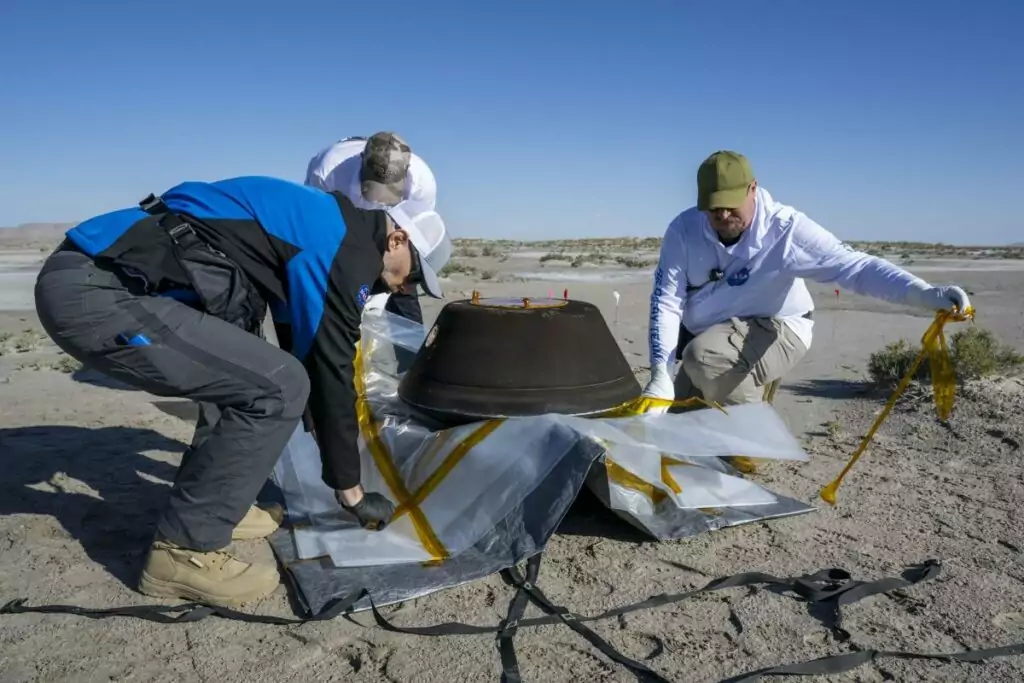In an exciting turn of events for space exploration, NASA’s OSIRIS-REx team has successfully delivered a capsule of rocks and dust collected from the asteroid Bennu to Earth. The sample landed at the Department of Defense’s Utah Test and Training Range near Salt Lake City on Sunday.

✅ AI Essay Writer ✅ AI Detector ✅ Plagchecker ✅ Paraphraser
✅ Summarizer ✅ Citation Generator
The capsule touched down at 8:52 a.m. MDT (10:52 a.m. EDT), and in less than two hours, was transported by helicopter to a temporary clean room at the training facility. Inside, it’s now being kept under a continuous flow of nitrogen to ensure no earthly contaminants interfere with the pristine sample.
The importance of the “nitrogen purge” is to keep the sample pure for scientific analyses. This nitrogen is a non-reactive gas that ensures the sample remains uncontaminated.
Why This Sample Matters
The samples brought back from Bennu will serve a great purpose. They’ll help scientists worldwide understand more about planet formation, the origin of organics and water that resulted in life on Earth, and provide insight into potentially hazardous asteroids.
NASA Administrator Bill Nelson lauded the mission, highlighting that it is the first American asteroid sample return. He emphasized the significance of learning more about potentially dangerous asteroids like Bennu and how these missions foster inspiration and unity.
Journey of the Capsule

The Bennu sample, weighing an estimated 8.8 ounces (250 grams), will soon be transported to NASA’s Johnson Space Center in Houston. Here, scientists will carefully disassemble the canister, weigh the sample, and catalog the collected rocks and dust. Over time, pieces of Bennu will be shared with scientists globally.
The journey to achieve this feat wasn’t short. OSIRIS-REx launched in 2016, reached Bennu in 2018, identified a collection site between 2019 and 2020, and collected the sample in October 2020. The return trip began in May 2021.
Dante Lauretta, the principal investigator for OSIRIS-REx, marked the day as a significant milestone for science. He emphasized the collaborative effort of the mission and noted that the analysis of these samples would usher in a new chapter in understanding our solar system.
Incredible Descent to Earth
After its long voyage, the OSIRIS-REx spacecraft released the capsule towards Earth from a distance approximately one-third the distance from Earth to the Moon. Piercing the atmosphere at a tremendous speed, the capsule’s descent was assisted by two parachutes, ensuring a gentle landing on the military range.
The landing was closely monitored, with instruments tracking its trajectory and a recovery team quickly dispatched to ensure its safety and transportation.
Rich Burns, the project manager for OSIRIS-REx, likened the moment to a pivotal baseball game, expressing immense pride in the team’s success.
Collaborative Endeavor
This mission was a joint effort with contributions from NASA Goddard, the University of Arizona, Lockheed Martin Space, Goddard and KinetX Aerospace, CSA (Canadian Space Agency), JAXA’s Hayabusa2 mission, and more. The success showcases the power of collaboration in advancing our understanding of space.
Discussing Space Travel in an Essay
NASA’s OSIRIS-REx mission has done something amazing by collecting samples from an asteroid. This makes us think about what else is possible in space. From how space affects our bodies to the idea of living on other planets, there’s so much we don’t know yet.
With all the new space technology, there are many interesting topics we can explore. This includes things like mining asteroids for resources or the idea of tourists traveling in space. Curious about these topics? We’ve put together a list of essay ideas that dive deeper into these exciting areas of space exploration.
| No. | Essay Topic | Description |
|---|---|---|
| 1 | The Evolution of Space Exploration | How space exploration has evolved from manned moon missions to asteroid sample collections. |
| 2 | The Ethical Implications of Colonizing Other Planets | Moral questions surrounding the colonization of planets, including potential extraterrestrial life considerations. |
| 3 | Space Travel’s Impact on Human Physiology | Challenges the human body faces in zero-gravity and the medical advancements necessary for long-duration space travel. |
| 4 | The Socioeconomic Impact of Commercial Space Travel | Influence of ventures like SpaceX and Blue Origin on the global economy and job market. |
| 5 | Asteroid Mining: The Next Gold Rush? | The potential and challenges of extracting resources from asteroids and its implications for Earth’s economy. |
| 6 | International Collaboration in Space Missions | How joint missions have fostered cooperation between nations and potential for future space exploration partnerships. |
| 7 | The Role of Robotics and AI in Future Space Exploration | The increasing importance of robotics and AI in space missions and their potential roles in exploration. |
| 8 | The Psychological Challenges of Deep Space Exploration | The mental health challenges astronauts may face on extended missions to distant locations. |
| 9 | Terraforming Mars: Science Fiction or Near-future Reality? | Feasibility and ethical concerns of transforming the Martian environment for human habitation. |
| 10 | The Importance of Space Travel in Addressing Climate Change | How space exploration can provide insights or solutions to Earth’s environmental challenges. |
| 11 | Space Tourism: Ethical Dilemmas and Economic Potential | The potential pitfalls and economic opportunities of the burgeoning space tourism industry. |
| 12 | The Search for Extraterrestrial Life and Its Implications for Humanity | Impacts and significance of finding life beyond Earth on culture, religion, and science. |
| 13 | Space Law: The Challenges of Legislating the Final Frontier | The complexities of creating legal frameworks for activities in space, including extraterrestrial rights. |
| 14 | Preserving Earthly Culture on Long-duration Space Missions | The importance of maintaining human culture and history on missions that might last multiple generations. |
| 15 | The Case for (or Against) a Space Force | Arguments surrounding the militarization of space and potential consequences. |
Follow us on Reddit for more insights and updates.





Comments (0)
Welcome to A*Help comments!
We’re all about debate and discussion at A*Help.
We value the diverse opinions of users, so you may find points of view that you don’t agree with. And that’s cool. However, there are certain things we’re not OK with: attempts to manipulate our data in any way, for example, or the posting of discriminative, offensive, hateful, or disparaging material.